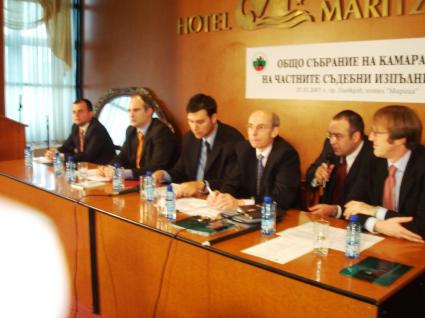The choice of the creditors
The professionalism of this very young private profession in Bulgaria (the majority of them are installed since 3 to 4 months) impresses the observer. The president of the Chamber, Georgi Dichev and the members of his board had invited the UIHJ (2) to take part in this meeting, as well as the representatives of the economic world, the national press, and the legal authorities of the country.
The national chamber of the private judicial officers of Bulgaria swarms with ideas to develop the however already constant economic activity - promotion campaign of the profession - intensive vocational training - electronic signature - development of new activities.
Bulgaria has the specificity of seeing cohabiting private judicial officers and civil servants, both sharing the same activities and the same tariff. Only professionalism, the service offered, and the effectiveness, determine the customers in his choice of the judicial officer in charge of carrying out the court decision. It seems that the creditors already made their choices, as shows the numerous transfers of files from civil servants judicial officers towards the private judicial officers. Tired by years of wait-and-see policy and inefficiency, the Bulgarian creditors turn in mass to the new private judicial officers to enforce court decisions (3).
Misadventures
The activity thus does not miss in a country which has just integrated the European Union since January 1, 2007 and which undoubtedly has some difficulties with the implementation of all the reforms which result from this. However this forced march towards the future is not done without some misadventures for the private judicial officers, as show the two following examples.
- The project of introduction of the VAT for the judicial officers tends to exonerate the civil servants judicial officers from it. This differentiated treatment causes to create a distortion for the debtors who will see the expenses increasing by 20% if they are enforced by a private judicial officer, whereas the expenses remain equal if the enforcement is carried out by a civil servant judicial officer.
The national Chamber of private judicial officers disputes the constitutionality of such a text and an action is in hand, as underlined by Georgi Dichev. For his part, Bernard Menut, secretary of the board of UIHJ, stressed that such a different treatment would raise the question of the violation of article 6-1 of the European Convention of Humans Rights. Since the Horsnby case the judicial officers know that enforcement of court decision is an element of an equitable lawsuit, and since the more recent Pini case, they are recognised as a distinctive essential element of a State of law. For his part, the debtor is entitled to an equitable enforcement and the application of the VAT (such as it is currently considered by the Bulgarian government for the private judicial officers) creates an inequitable situation for the debtor.
One can reasonably hope that the Bulgarian government will re-examine its project so that the application of the VAT is done with constant constraints for the debtor (4).
- The access to information concerning the assets of the debtor encounters unexpected difficulties for the private judicial officers. Even if the access is largely open, they must indeed pay to obtain certain information, while at the same time their civil servant colleagues do not have to pay to obtain them. If they had to, they wouldn't be in a position to do so, by lack of funds. There again, the inequitable treatment made to the debtor (who finally is the one who pays the expenses) must end thanks to the action of the private judicial officers.
A high level of trust
In his moral report, President Georgi Dichev underlined how invaluable was the help of the UIHJ during the drafting of the texts relating to the profession, especially at the moment of the drafting of the statute, the discussion of the tariff discussion or the vocational training. The UIHJ experts (5) had gone to Bulgaria to support the reform process.
Georgi Dichev denounced the aggressions and intimidations that certain private professionals had been the object of without changing the determination of the private judicial officers to achieve their aims. He was pleased with the received support on behalf of the legal authorities at the time of these regrettable events.
The will to preserve very high ethical standards will make it possible to develop the image of the private judicial officer in Bulgaria. The national chamber of private judicial officers of Bulgaria clearly understood that ethics is as necessary as the activity for the profession. There is no doubt that Georgi Dichev's remarks in this direction will be well appreciated from the legal and political authorities of the country, but also from the public opinion.
The high level of confidence towards the private judicial officers is high, and the profession must do all that will be necessary to maintain it and even to increase it. The economic and political future of the profession is exploited its capacity to convince and like in a country which plays from now on in the “major league” (6).
Notes
(1) 2nd river of Bulgaria after the Danube
(2) Represented by Bernard Menut (France) secretary of the board and Adrian Stoïca (Romania), assistant Treasurer
(3) In 3 months, the private profession recovered 90 million raised - 45 million euros immediately reinvested in the Bulgarian economy.
(4) The private judicial officers would be subjected to the VAT - 20% - whereas their civil servants colleagues would be exonerated from it.
(5) Jos Uitdehaag (Holland) and Bernard Menut (France), with Patrick Safar (France)
(6) European Union made up of 27 partners.


